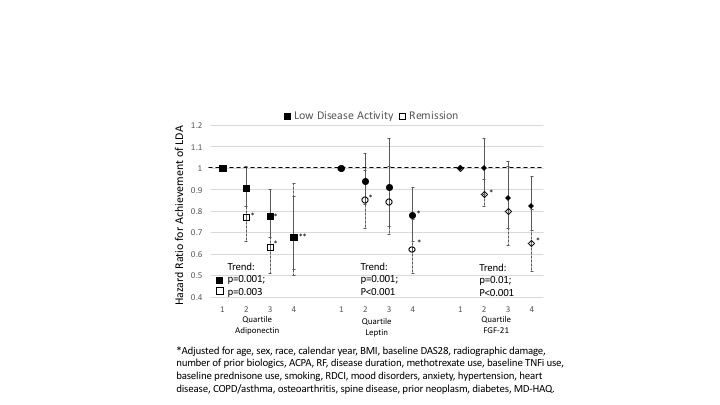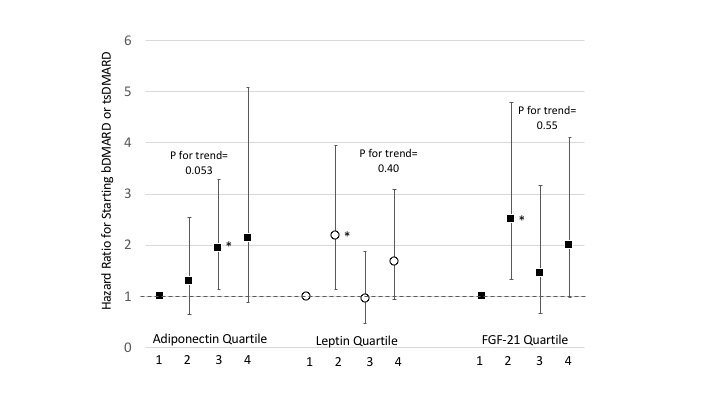Session Information
Date: Sunday, November 7, 2021
Title: RA – Diagnosis, Manifestations, & Outcomes Poster II: Miscellaneous Aspects of RA (0786–0812)
Session Type: Poster Session B
Session Time: 8:30AM-10:30AM
Background/Purpose: Adipokines are fat-secreted proteins that serve as metabolic regulators. Prior studies have identified associations between adipokines and disease characteristics such as disease activity and radiographic progression in rheumatoid arthritis (RA) suggesting a link with disease phenotype, however, they have not been evaluated as prognostic biomarkers. In this study, we determined if circulating levels of adipokines were associated with the achievement of low disease activity (LDA) and clinical remission in RA. We also evaluated whether adipokines predicted the escalation of therapy to the use of biologic or targeted synthetic DMARDs.
Methods: This study evaluated patients with rheumatologist-diagnosed RA from Veteran patients who had moderate-high disease activity at enrollment in a registry study. Serum adiponectin, leptin, and fibroblast growth factor (FGF)-21 were assessed at enrollment using a multi-analyte panel. The primary outcome was the time to achievement of LDA (DAS28< 3.2). Secondary outcomes included the achievement of remission (DAS28< 2.6), achievement of low values for DAS28 subcomponents, and the incident use of bDMARDs or tsDMARDs. We used Cox proportional hazards models to evaluate the time to LDA by quartile of each adipokine among participants not in LDA at enrollment. Cox models were also used to assess the time to the initiation of bDMARDs or tsDMARDs among patients that were naïve to these therapies at enrollment regardless of disease activity. Models were comprehensively adjusted for demographics, calendar year, body mass index (BMI), disease characteristics, and comorbidity.
Results: Among 1276 patients [Mean age (SD): 70.9 (10.3) ; 89% male] that were eligible for inclusion, 827 achieved LDA and 598 achieved remission over 2,287 and 4,096 person-years of follow-up, respectively. Higher adipokine levels were associated with significantly lower rates of LDA and remission in a dose-dependent manner independent of a number of other clinical factors including BMI (Figure 1). Adipokines were also associated with lower rates of achievement of a low patient and evaluator global score and a low tender joint count, but not swollen joint count. Leptin was also associated with a lower likelihood of achievement of a low CRP. Among the 1352 biologic-naïve patients at enrollment total of 68 patients initiated a bDMARD or tsDMARD in 5,475 person-years of follow-up. Higher adipokine levels tended to be associated with a higher likelihood of initiation of new therapies (Figure 2).
Conclusion: Patients with high levels of adipokines demonstrate lower rates of achieving LDA and remission; an association that is independent of a number of clinical factors including baseline disease activity and BMI. In addition, patients with elevated adipokine levels, particularly adiponectin, might also be more likely to require escalation to a bDMARD or tsDMARD. While it remains unclear if adipokines play a causal role in promoting refractory disease, these data do support adipokines as prognostic biomarkers that may help to identify patients who are likely to experience more refractory disease over time. Further study is needed to further clarify the role of adipokines in the pathogenesis of the disease.
To cite this abstract in AMA style:
Baker J, England B, George M, Wysham K, Kerr G, Reimold A, Monach P, Kunkel G, Sauer B, Hamilton B, Hunter C, Duryee M, Thiele G, Mikuls T. Adipokine Levels and Associations with Achievement of Low Disease Activity in Rheumatoid Arthritis [abstract]. Arthritis Rheumatol. 2021; 73 (suppl 9). https://acrabstracts.org/abstract/adipokine-levels-and-associations-with-achievement-of-low-disease-activity-in-rheumatoid-arthritis/. Accessed .« Back to ACR Convergence 2021
ACR Meeting Abstracts - https://acrabstracts.org/abstract/adipokine-levels-and-associations-with-achievement-of-low-disease-activity-in-rheumatoid-arthritis/


